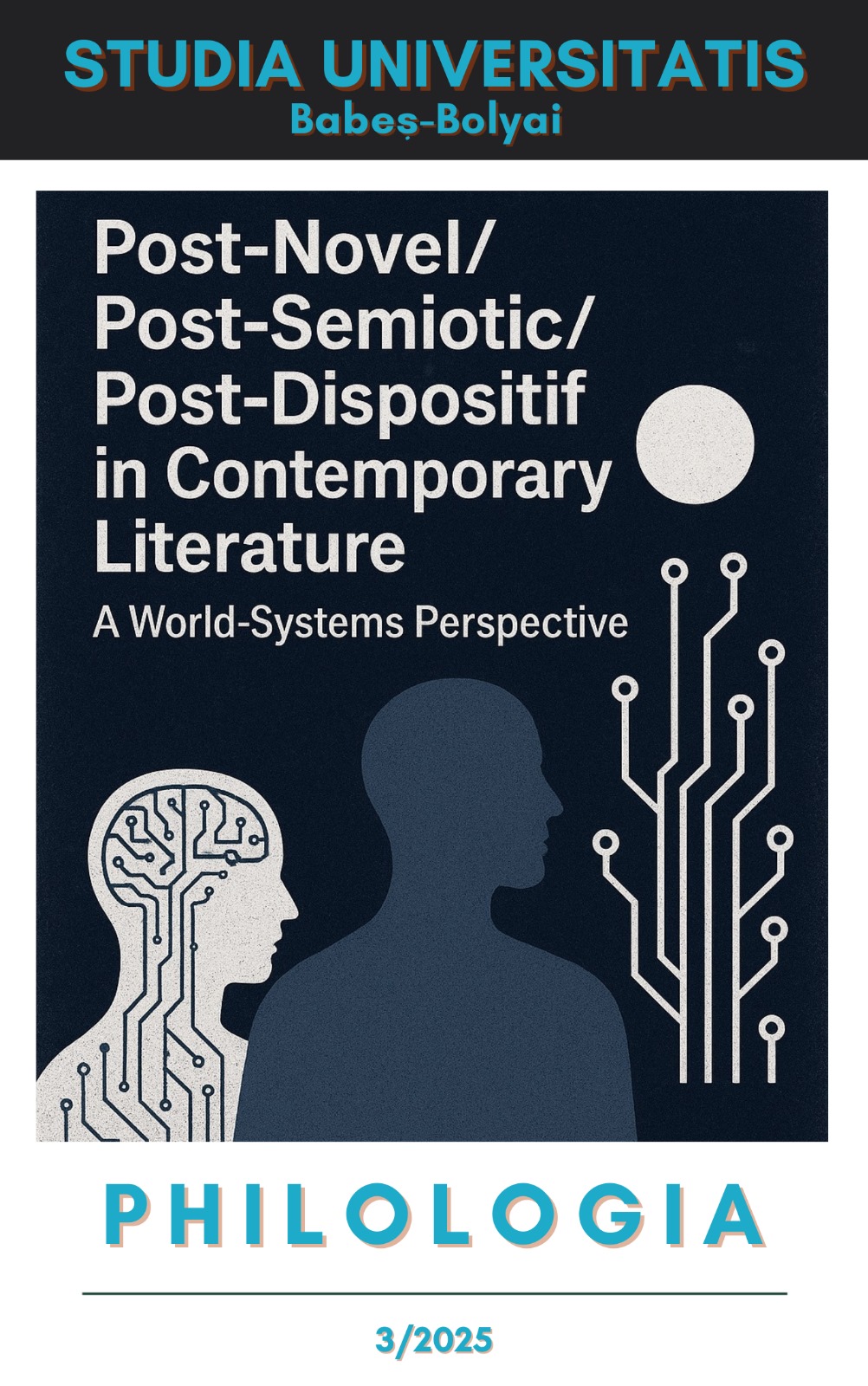HYDROCOLONIAL MEMORY, GENDERED TRAUMA AND QUEER ERASURE IN KOLEKA PUTUMA’S COLLECTIVE AMNESIA
DOI:
https://doi.org/10.24193/subbphilo.2025.3.09Keywords:
memory, trauma, queer erasure, hydrocolonialism, post-apartheid South Africa, Koleka Putuma, poetry, identityAbstract
Hydrocolonial Memory, Gendered Trauma and Queer Erasure in Koleka Putuma’s Collective Amnesia. This article contributes to the thematic direction of this volume by foregrounding post-liberal critical positions and adopting a methodological framework that can be described as post-semiotic in essence—one that prioritizes affect, materiality, and embodied memory over representational paradigms. Koleka Putuma’s Collective Amnesia explores the complex intersections of memory, identity, and trauma within the socio-political landscape of post-apartheid South Africa. Central to this poetry collection is the motif of water, employed both as a symbol of colonial violence and as a transformative space for reclaiming marginalized identities—particularly those of Black womxn and queer individuals. Through the lenses of hydrocolonialism, ecofeminism, and postmemory, this study examines how Putuma challenges dominant narratives of race, gender, and sexuality, revealing the fluidity of identity and the persistence of historical trauma across generations. Moreover, the collection confronts the systemic erasure of queer identities by disrupting heteronormative and patriarchal frameworks embedded in religious and cultural discourses. By moving beyond traditional semiotic readings and instead emphasizing embodied, affective, and ecological dimensions of trauma and resistance, this analysis engages with critical post-liberal methodologies that remain underexplored in current literary scholarship. By situating Collective Amnesia within broader conversations on queer erasure and memory politics, this article not only highlights Putuma’s poetic activism as a powerful call for visibility, resistance, and healing, but also affirms the necessity of reading contemporary literature through critical frameworks that exceed representational politics. In doing so, it aligns with the volume’s concern for rethinking theoretical orthodoxies and making space for neglected critical vocabularies and epistemologies.
REZUMAT. Memorie hidrocolonială, gendered trauma și queer erasure în Collective Amnesia de Koleka Putuma. Lucrarea de față se înscrie în tematica volumului prin aducerea în discuție a unor poziții critice post-liberale adesea ignorate în cadrul studiilor literare actuale și prin utilizarea unei metodologii care poate fi caracterizată drept post-semiotică în esența sa—una care privilegiază afectul, materialitatea și memoria corporală în detrimentul abordărilor centrate strict pe reprezentare. Lucrarea analizează volumul de poezie Collective Amnesia al Kolekăi Putuma prin prisma hidrocolonialismului, traumei de gen și a ștergerii identităților queer în contextul de post-apartheid din Africa de Sud. Motivul acvatic este explorat ca simbol dual al violenței coloniale și al unui spațiu fluid și transformator pentru identități marginalizate și periferice, în special pentru femeile de culoare și persoanele queer. Studiul aplică cadre teoretice de hidrocolonialism, ecofeminism și postmemorie pentru a evidenția modul în care Putuma confruntă normele heteronormative și patriarhale, contestând ștergerea identităților queer și oferind o platformă poetică pentru vizibilitate și vindecare. În același timp, analiza propune o lectură dincolo de grilele semiotice convenționale, insistând asupra dimensiunii afective, ecologice și corporale a traumei și rezistenței, în consonanță cu direcții teoretice post-liberale încă insuficient explorate în critica literară contemporană. Articolul evidențiază potențialul radical al operei lirice a Kolekăi Putuma de a rescrie narațiunile dominante privind rasa, genul și sexualitatea în peisajul cultural și politic sud-african contemporan, contribuind deschiderea către epistemologii marginalizate.
Cuvinte-cheie: hidrocolonialism, traumă de gen, ștergerea identității queer, Koleka Putuma, Africa de Sud, post-apartheid, poezie, identitate.
Article history: Received 07 July 2025; Revised 01 September 2025; Accepted 11 September 2025; Available online 24 September 2025; Available print 30 September 2025
References
Ahmed, Sarah. 2004. The Cultural Politics of Emotion. London: Routledge.
Burger, Benjamin. 2020. “Our Respect for Water Is What You Have Termed Fear”: The Ocean in the Poetry of Ronelda S. Kamfer and Koleka Putuma. Journal of Southern African Studies. 46 (1): 23-38.
Byrne, Deirdre C. 2021. “Water in the Anthropocene: Perspectives on Poetry by South African Women”. Feminist Encounters: A Journal of Critical Studies in Culture and Politics. 5 (1): 1-11.
Chow-Quesada, Shun Man Emily. 2024. “The Literary Space of Black Women: Trauma, Memory, and Literary Activism in Selected Works of Koleka Putuma”. Current Writing: Text and Reception in Southern Africa. 36 (2): 211-227.
https://doi.org/10.1080/1013929X.2024.2410082
Gandhi, Leela. 1998. Postcolonial Theory: A Critical Introduction. Edinburgh: Edinburgh University Press.
Gevisser, Mark. 2006. Lost and Found in Johannesburg: A Memoir. Johannesburg: Jonathan Ball Publishers.
Hirsch, Marianne. 2012. The Generation of Postmemory: Writing and Visual Culture After the Holocaust. New York: Columbia University Press.
Mashile, Lebo. 2006. In a Ribbon of Rhythm. DynaBooks.
Merchant, Carolyn. 1980. The Death of Nature: Women, Ecology, and the Scientific Revolution. New York: Harper & Row.
Neimanis, Astrida. 2017. Bodies of Water: Posthuman Feminist Phenomenology. London: Bloomsbury Academic.
Phalafala, Uhuru. 2017. Collective Amnesia by Koleka Putuma. Feminist Africa, 22.
Pieterse, Annel. 2018. “Knowledge and Unlearning in the Poetry of Koleka Putuma and Sindiswa Busuku-Mathese.” Scrutiny 2. 23 (1): 35-46.
Plumwood, Val. 1993. Feminism and the Mastery of Nature. London: Routledge.
Putuma, Koleka. 2017. Collective Amnesia: Poems. Umhlanga.
Putuma, Koleka. 2015. “An Open Letter to TEDxStellenbosch Organisers.” Word n Sound Live Lit, December 15.
Sacks, Susanna L. 2024. Networked Poetics, Amherst: University of Massachusetts Press.
Sharpe, Christina. 2016. In the Wake: On Blackness and Being. Durham and London: Duke University Press. https://doi.org/10.1515/9780822373452
Downloads
Published
How to Cite
Issue
Section
License
Copyright (c) 2025 Studia Universitatis Babeș-Bolyai Philologia

This work is licensed under a Creative Commons Attribution-NonCommercial-NoDerivatives 4.0 International License.



